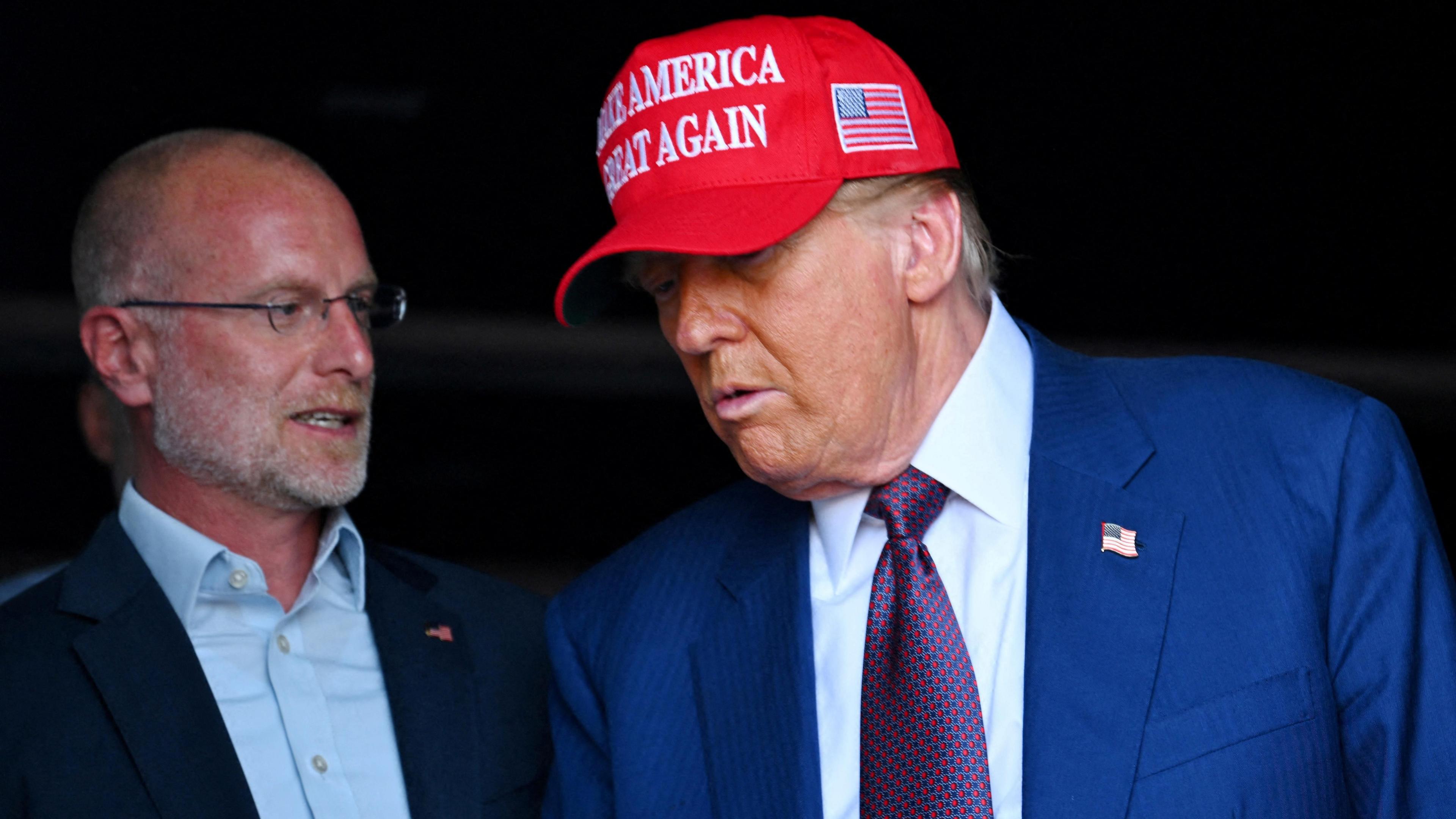US broadcast regulator writes to BBC over Panorama edit of Trump speech

FCC boss Brendan Carr (L) has written to the BBC and US public service broacasters NPR and PBS
- Published
The US broadcast regulator has written to the BBC over a Panorama episode that edited together parts of a 2021 speech by US President Donald Trump.
Federal Communications Commission (FCC) chief Brendan Carr wrote to the, external BBC's outgoing director general Tim Davie - and to top executives at public service broadcasters NPR and PBS, whose member stations air some BBC content.
Carr said he wanted to determine if the BBC provided either the video or audio of the spliced speech to any broadcaster "regulated by the FCC for airing in the US".
The BBC has previously stated it did not have the rights to, and did not, distribute the Panorama episode on its US channels.
Trump has threatened to sue over the programme, saying it defamed him. The BBC has apologised, while refusing the president's demand for financial compensation.
The broadcaster has acknowledged the edit gave "the mistaken impression that President Trump had made a direct call for violent action" on the day of the riot at the US Capitol building on 6 January 2021.
In Trump's speech in the Panorama episode, Trump: A Second Chance?, he said: "We're going to walk down to the Capitol, and we're going to cheer on our brave senators and congressmen and women."
More than 50 minutes later in the speech, he said: "And we fight. We fight like hell."
In the Panorama programme the clip shows him as saying: "We're going to walk down to the Capitol... and I'll be there with you. And we fight. We fight like hell."
Of the edit, Carr wrote: "In doing so, the BBC programme depicts President Trump voicing a sentence that, in fact, he never uttered. That would appear to meet the very definition of publishing a materially false and damaging statement."
The letter goes on to say: "As you may know, broadcasters regulated by the FCC have a legal obligation to operate in the public interest. Those public interest requirements include prohibitions on news distortion and broadcast hoax."
Carr's letter also stated that he was "writing to determine whether any FCC regulations have been implicated by the BBC's misleading and deceptive conduct".
The BBC has said it has nothing to add to its previous public statements.
Last week the corporation set out why it does not think it has a case to answer in a letter to Trump's legal team.
As well as stating it did not have the rights to, and did not, distribute the Panorama episode on its US channels, the BBC also said that when the documentary was available on BBC iPlayer, it was restricted to viewers in the UK.
The BBC letter also argued that the documentary did not cause Trump harm, as he was re-elected shortly after.
"I think I have to do it," Trump told reporters last weekend of his plan to take legal action. "They cheated. They changed the words coming out of my mouth."
Following his threat to sue for "anywhere between $1bn and $5bn", Trump was expected to speak to UK Prime Minister Keir Starmer about the issue at the weekend. Details have not yet emerged.
Why is Donald Trump threatening to sue the BBC?
- Published6 days ago
Trump says he will take legal action against BBC over Panorama edit
- Published5 days ago
BBC apologises to Trump over Panorama edit but refuses to pay compensation
- Published6 days ago
The Panorama episode was aired in the lead-up to the 2024 presidential election, which Trump went on to win. The BBC has said it will not show it again.
The issue with the episode was highlighted by an earlier Daily Telegraph report that cited a leaked BBC memo written by Michael Prescott, a former independent external adviser to the corporation's editorial standards committee. Mr Prescott also raised concerns about several other elements of the BBC's news output.
BBC director general Tim Davie resigned during the furore, as did BBC News chief Deborah Turness.
In the US, broadcasting licenses are issued by the FCC and are regulated by the federal agency.
The BBC is regulated by the UK watchdog Ofcom.
UK-based media lawyer Mark Stephens told BBC News that Trump's team appeared to hope the FCC could establish jurisdiction by proving the edited clip aired in the US.
"In reality, the FCC will likely come up empty. If the programme wasn't broadcast in America, that's fatal to Trump's claim and to the FCC investigation," he said.
BBC News has contacted the FCC, which shared the letter from its chairman, as well as NPR and PBS, for comment.